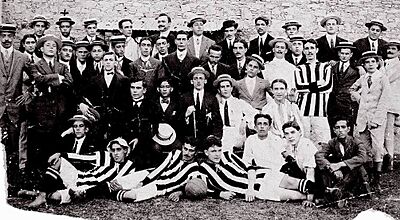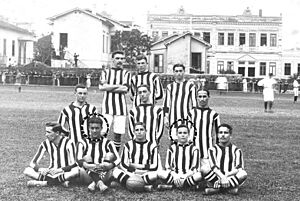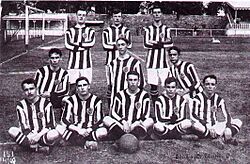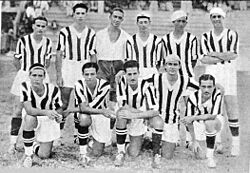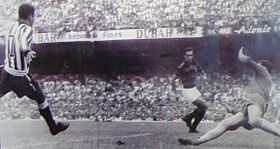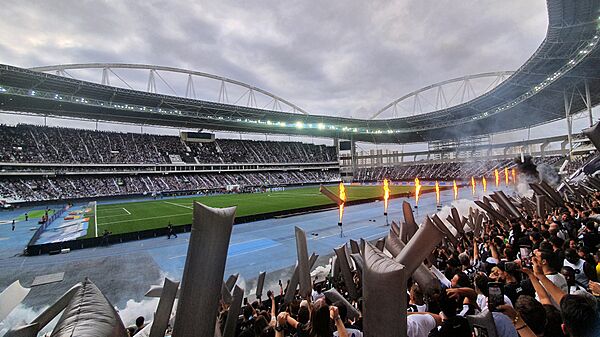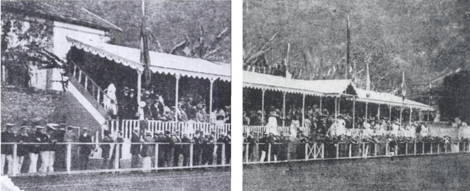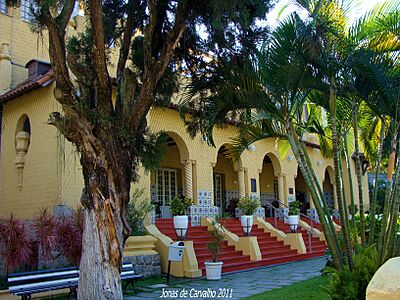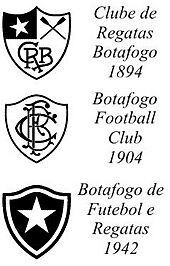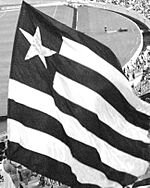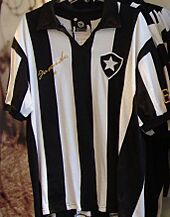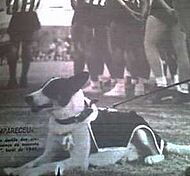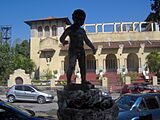Botafogo FR facts for kids
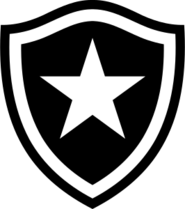 |
||||
| Full name | Botafogo de Futebol e Regatas | |||
|---|---|---|---|---|
| Nickname(s) | Fogo (Fire) Fogão (Stove/Big Fire) Estrela Solitária (The Lone Star) O Glorioso (The Glorious One) Alvinegro Carioca (Rio's Black and White) O Mais Tradicional (The Most Traditional) Campeão da América (Champion of America) |
|||
| Founded | 12 August 1904, as a football club | |||
| Stadium | Estádio Olímpico Nilton Santos | |||
| Capacity | 46,831 | |||
| SAF Owner | John Textor (90%) | |||
| President | João Paulo Magalhães Lins | |||
| Head coach | Davide Ancelotti | |||
| League | Campeonato Brasileiro Série A Campeonato Carioca |
|||
| 2022 2022 |
Série A, 11th of 20 Carioca, 4th of 12 |
|||
|
||||
Botafogo de Futebol e Regatas is a famous Brazilian sports club from the Botafogo neighborhood in Rio de Janeiro. While they play many different sports, they are most famous for their amazing association football (soccer) team. Botafogo competes in the Campeonato Brasileiro Série A, which is Brazil's top football league. They also play in the main league for the state of Rio de Janeiro.
Botafogo is one of Brazil's "Big 12 Clubs". They have won the Brazilian Championship three times (in 1968, 1995, and 2024). The club also won the prestigious Copa Libertadores in 2024 and the Copa CONMEBOL in 1993. Botafogo holds some impressive records in Brazilian football. This includes the most unbeaten matches: 52 games in a row between 1977 and 1978. They also have the record for the most players called up to the Brazilian national team for World Cups. In 1909, Botafogo achieved the biggest victory ever in Brazilian football, winning a match 24–0 against Sport Club Mangueira.
In 2000, FIFA Magazine subscribers voted Botafogo 12th in the world for the FIFA Club of the Century. By 2024, Botafogo was ranked 5th globally in the IFFHS Men's Club World Ranking, making them the highest-ranked club from South America. In 2025, the club qualified for the FIFA Club World Cup. They surprised many by beating European champions Paris Saint-Germain 1–0 in the group stage, moving on to the next rounds. Botafogo was also one of five finalists for the 2025 Ballon d’Or Men’s Club of the Year award, being the only non-European club nominated.
Contents
The Story of Botafogo
How Botafogo Began
The club's story started on July 1, 1894, when the Club de Regatas Botafogo was founded in Rio de Janeiro. It was originally a club for rowing.
Later, on August 12, 1904, another club was formed in the same neighborhood. It was first called the Electro Club. The idea came from students during an algebra lesson. Soon after, on September 18, the club changed its name to Botafogo Football Club. This new name was suggested by Dona Chiquitota, a grandmother of one of the founders. The team's colors, black and white, were chosen because one of the founders, Itamar Tavares, liked Juventus FC. The club's badge, with the letters BFC, was designed by Basílio Vianna Jr. The Botafogo Football Club quickly became one of the best football teams in Rio de Janeiro, winning championships in 1907, 1910, and 1912.
Since both clubs had the same name, were in the same area, used the same colors, and had many of the same fans, it seemed natural for them to join. This happened on December 8, 1942. The idea for the merger came after a sad event during a basketball game between the two clubs. A player from Botafogo Football Club, Armando Albano, suddenly passed away. The president of Club de Regatas Botafogo, Augusto Frederico Schmidt, spoke about unity. The president of Botafogo Football Club, Eduardo Góis Trindade, agreed. They decided that their clubs should become one. This is how the Botafogo de Futebol e Regatas club was finally created. The football club's badge changed to black, and the lone star from the rowing club's badge became its main symbol.
Botafogo's Triumphs on the Field
The team won the Campeonato Carioca (state championship) in 1907, 1910, and 1912. In 1909, they famously beat Mangueira 24–0, which is still the highest score ever in Brazilian football. They continued to win state titles in 1930, 1932, 1933, 1934, and 1935.
In the 1940s, after the clubs merged, Heleno de Freitas was the team's best player. He scored 204 goals in 233 matches. However, he left for Boca Juniors in 1948, the same year Botafogo won its 9th state championship.
Botafogo won the Campeonato Carioca again in 1957, 1961, and 1962. In 1968, they won the Serie A, becoming the first club from Rio to win the Brazilian league. After a 21-year wait, the club won the state championship in 1989 and again in 1990.
In the 1990s, Botafogo won the Copa Conmebol in 1993. This competition was a precursor to the current Copa Sudamericana. In 1995, they won the Brazilian League for the second time. They secured the title after a 1–1 draw against Santos FC in the final match in São Paulo.
Botafogo was relegated to the Second Division in 2002 after finishing last in the Brazilian League. But they quickly bounced back! In 2003, they finished second in Brazil's Second Division, right after Palmeiras, and returned to the First Division. The club won the Rio de Janeiro State Championship again in 2006, and then in 2010 and 2013 with famous players like Loco Abreu and Clarence Seedorf. In the 2020 Série A season, Botafogo had a tough time and finished last, which meant they were relegated to the Série B for the third time.
Today, Botafogo is special because it is the only club to have won titles in three different centuries. This includes a state championship for rowing in 1899.
A New Chapter: The SAF Era
In early 2020, Botafogo started a big change. They decided to turn their football division into a business, which could be partly sold to investors. This was a new law that allowed football clubs to be run as companies. It was a way to help the club with its financial challenges. However, being relegated to Série B delayed these plans.
By 2021, Botafogo's debt was very high. They finished 6th in the Rio de Janeiro State Championship. The Série B season started slowly, but things changed when manager Enderson Moreira was hired. He helped Botafogo win the 2021 Série B title, bringing them back to Brazil's top football league. This was Botafogo's second Série B title.
During this time, the club was also reorganizing. They hired a new CEO and made their team smaller. Botafogo worked with an investment company, XP Inc., to find buyers for its football division. A new law, the Sociedade Anônima de Futebol (SAF) law, made it possible for foreign investors to buy shares in Brazilian football clubs.
After returning to Série A, Botafogo completed its change to the SAF structure. The original social club still owned 100% of the new Botafogo SAF shares. In January 2022, it was announced that American investor John Textor was interested in buying a large part of Botafogo. Textor also owns a big share in the Premier League club Crystal Palace F.C.. In February 2022, the club confirmed that Textor's company, Eagle Holdings, bought 90% of Botafogo's football division. This marked the start of an exciting new era for the club.
Textor's first big decision was to replace manager Enderson Moreira with Portuguese manager Luís Castro. Castro joined Botafogo in March 2022, and the team quickly built their squad for the 2022 Campeonato Brasileiro. Botafogo finished that year's league in 11th place, which earned them a spot in the 2023 Copa Sudamericana.
In the 2023 Campeonato Brasileiro, Botafogo surprised everyone. They were expected to finish in the top 6, but they took first place after only three rounds. They even led the league by 13 points after 19 matches, having one of the best first halves of a season in Brazilian football history. In June 2023, coach Luís Castro left for Al Nassr in Saudi Arabia. Portuguese manager Bruno Lage then took over. However, due to poor results, Lage was dismissed after about three months. For the rest of the 2023 season, the club's leaders promoted two fan favorites: Lúcio Flávio became the interim coach, with former Argentine defender Joel Carli as his assistant.
Many changes in managers caused Botafogo to lose their strong lead in the league. The team won only 2 of their last 17 games. They not only lost the title to Palmeiras but also dropped to 5th place. This meant they missed out on automatically qualifying for the Copa Libertadores. They also had early exits in the Copa do Brasil and Copa Sudamericana, and a disappointing Campeonato Carioca. This made 2023 one of the most challenging seasons in the club's history. However, the club's total debt has been reduced and is now around 730 million reais.
Botafogo's Home Stadium
The team plays its home games at the Estádio Olímpico Nilton Santos. This stadium is named after Nilton Santos, a legendary former club player and a two-time World Cup champion with the Brazil national football team. Many consider him one of the greatest left-backs ever. Fans often call the stadium Engenhão, after the Engenho de Dentro neighborhood where it is located. The stadium was built for the 2007 Pan American Games and also hosted events during the 2016 Summer Olympics.
Other stadiums Botafogo has used throughout its history include:
- Maracanã Stadium, from 1950 to 2007.
- Voluntários da Pátria Street Field, the club's very first pitch in its original neighborhood.
- Estádio General Severiano, the club's first stadium that it owned (1913-1974).
- Marechal Hermes Stadium, used for smaller matches between 1978 and 1986.
- Estádio Caio Martins, located in the nearby city of Niterói (1990-2004).
- Estádio Luso Brasileiro, used during the 2005 and 2016 seasons.
Exciting Rivalries
Botafogo has big rivalries with the other important clubs from Rio: Fluminense, Flamengo, and Vasco da Gama.
The matches against Fluminense are called the "Clássico Vovô" (Grandfather Derby). This is because it is the oldest derby in all of Brazilian football, with the teams first playing each other in 1905.
Games with Vasco are known as the "Clássico da Amizade" (Friendship Derby). Historically, fans of both clubs have been friendly, making it one of the less intense rivalries in the city.
The derby against Flamengo, known as "The Rivalry Derby," is Botafogo's biggest and most intense match. The competition goes beyond the field, involving fans and club leaders. Players who perform well in these matches often become club heroes. Famous examples include Garrincha, Manga, Jairzinho, Túlio Maravilha, and more recently Loco Abreu and Jefferson. Even Flamengo's biggest star, Zico, once said that as a child, he disliked Botafogo the most because of their strong performance in these derbies.
Outside of Rio, Botafogo also has a historic rivalry with Santos FC that began in the 1960s.
Club Symbols and Traditions
The Lone Star
The Lone Star (Estrela Solitária) is a very important symbol for Botafogo. You can see it on the club's flag and crest today. This star was originally the main symbol of the Club de Regatas Botafogo (the rowing club). After the two Botafogo clubs merged, the Lone Star became one of the most important symbols for the football team. It was first meant to represent the planet Venus, also known as the Morning Star. The rowing team would often see Venus at sunrise when they practiced very early in the morning.
The Club Flag
The old flag of Club de Regatas Botafogo was white with a small black square that held the Lone Star. The Football Club had a flag with nine black and white stripes and its crest in the middle. When the clubs merged, the new Botafogo de Futebol e Regatas flag combined elements from both. It has five black and four white stripes, with a black square in the upper left corner that features the Lone Star.
Team Uniform
Botafogo's main uniform is a black jersey with vertical white stripes, black shorts, and grey socks. Their second uniform is all white. Sometimes, they might also use an all-black uniform. While the socks are usually grey, they can sometimes be black or even white.
Meet the Mascots
The dog Biriba is one of Botafogo's most traditional mascots. In 1948, this real stray dog was known for running onto the field. He became a lucky charm that helped the team win the Campeonato Carioca title.
Another mascot for Botafogo is Manequinho. This is a statue of a boy urinating, similar to Brussels' famous Manneken Pis. The statue stands near Botafogo's headquarters. Fans sometimes dress it in a Botafogo jersey. The very first mascot was Donald Duck, drawn by cartoonist Lorenzo Mollas in the early 1940s wearing a Botafogo jersey. However, this was never made official due to copyright issues.
Botafogo's Trophies and Achievements
The club holds some of Brazilian football's top records. This includes the most unbeaten matches: 52 games between 1977 and 1978. They also have the most unbeaten games in the Brazilian Championship: 42, also between 1977 and 1978. Botafogo also has the most player participations in total matches for the Brazil national team (1,094 participations). They also sent the most players to the World Cup for the Brazil national team.
Official Tournaments
| Continental Titles | ||
|---|---|---|
| Competitions | Titles | Seasons |
| Copa Libertadores | 1 | 2024 |
| Copa CONMEBOL | 1 | 1993 |
| National Titles | ||
| Competitions | Titles | Seasons |
| Campeonato Brasileiro Série A | 3 | 1968, 1995, 2024 |
| Campeonato Brasileiro Série B | 2s | 2015, 2021 |
| Inter-state Titles | ||
| Competitions | Titles | Seasons |
| Torneio Rio–São Paulo | 4 | 1962, 1964, 1966, 1998 |
| State Titles | ||
| Competitions | Titles | Seasons |
| Campeonato Carioca | 21 | 1907, 1910, 1912, 1930, 1932, 1933, 1934, 1935, 1948, 1957, 1961, 1962, 1967, 1968, 1989, 1990, 1997, 2006, 2010, 2013, 2018 |
- record
- s shared record
Runners-up (Second Place)
- Recopa Sudamericana (2): 1994, 2025
- Derby of the Americas (1): 2024
- Campeonato Brasileiro Série A (3): 1962, 1972, 1992
- Copa do Brasil (1): 1999
- Supercopa do Brasil (1): 2025
- Campeonato Brasileiro Série B (1): 2003
- Torneio Rio–São Paulo (3): 1960, 1961, 2001
- Campeonato Carioca (21): 1908, 1909, 1913, 1914, 1916, 1918, 1939, 1942, 1944, 1945, 1946, 1947, 1959, 1971, 1975, 2007, 2008, 2009, 2012, 2015, 2016
Youth Team Achievements
- Campeonato Brasileiro Sub-20 (1): 2016
- Taça Belo Horizonte de Juniores (1): 1999
- Copa Macaé de Juvenis (1): 1997
Special Awards
- Fita Azul (1): 1965
The Fita Azul do Futebol Brasileiro (Brazilian Football Blue Ribbon) was an award given to clubs that had successful trips playing matches outside of Brazil.
Players
Current Squad
|
|
Botafogo B and Youth Academy
|
|
Other Players Under Contract
|
Players Out on Loan
|
|
Club Staff
Amazing Club Records
| World's Best Players from Botafogo | ||
| # | Name | Year Recognized |
|---|---|---|
| 1. | 1958 | |
| 2. | 1962 | |
| Botafogo Players Who Won the World Cup | ||
| # | Name | Year(s) Won |
|---|---|---|
| 1. | 1958, 1962 | |
| 2. | 1958, 1962 | |
| 3. | 1958, 1962 | |
| 4. | 1962 | |
| 5. | 1962 | |
| 6. | 1970 | |
| 7. | 1970 | |
| 8. | 1970 | |
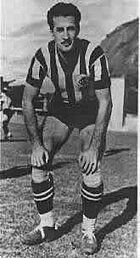
| Most Appearances for Botafogo | ||||
| # | Name | Matches | Goals | Years Played |
|---|---|---|---|---|
| 1. | 723 | 11 | 1948–64 | |
| 2. | 612 | 243 | 1953–65 | |
| 3. | 459 | * | 2003–2005 and 2009–2018 | |
| 4. | 453 | 6 | 1967–76 | |
| 5. | 444 | 306 | 1954–64 | |
| 6. | 442 | * | 1959–68 | |
| 7. | 442 | 15 | 1967–76 | |
| 8. | 422 | 115 | 1940–54 | |
| 9. | 413 | 186 | 1962–74, 1981 | |
| 10. | 412 | * | 1993–02 | |
| 11. | 387 | 4 | 1970–79 | |
| 12. | 384 | 12 | 1946–57 | |
| 13. | 371 | 2 | 1945–56 | |
| 14. | 354 | 13 | 1987–90, 1994–96 | |
| 15. | 352 | 154 | 1962–73 | |
| 16. | 347 | 27 | 1955–62 | |
| 17. | 340 | 116 | 1975–82 | |
| * goalkeeper. | ||||
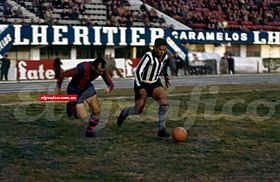
| Most Goals Scored for Botafogo | |||||||||||||
| # | Name | Goals | Matches | Goals per Match | |||||||||
|---|---|---|---|---|---|---|---|---|---|---|---|---|---|
| 1. | 306 | 444 | 0.68 | ||||||||||
| 2. | 261 | 303 | 0.86 | ||||||||||
| 3. | 243 | 612 | 0.39 | ||||||||||
| 4. | 209 | 235 | 0.88 | ||||||||||
| 5. | 190 | 201 | 0.94 | ||||||||||
| 6. | 186 | 413 | 0.45 | ||||||||||
| 7. | 171 | 200 | 0.85 | ||||||||||
| 8. | 159 | 223 | 0.71 | ||||||||||
| 9. | 154 | 352 | 0.43 | ||||||||||
| 10. | 144 | 176 | 0.81 | ||||||||||
| 11. | 136 | 231 | 0.58 | ||||||||||
| 12. | 135 | 206 | 0.65 | ||||||||||
| 13. | 127 | 301 | 0.42 | ||||||||||
| 14. | 116 | 340 | 0.34 | ||||||||||
| 15. | 115 | 422 | 0.27 | ||||||||||
| 16. | 114 | 313 | 0.36 | ||||||||||
| 17. | 110 | 174 | 0.63 | ||||||||||
| 18. | 105 | 158 | 0.66 | ||||||||||
| 19. | 102 | 242 | 0.42 | ||||||||||
| 20. | 96 | 248 | 0.39 | ||||||||||
- Note: numbers do not count matches played in Torneio Início.
- Source: RSSSF Brasil – Botafogo
Other Sports at Botafogo
Basketball
See also
- Botafogo de Futebol e Regatas (women)
- Botafogo de Futebol e Regatas (basketball)


